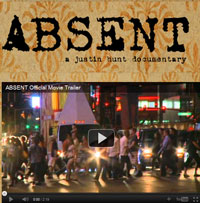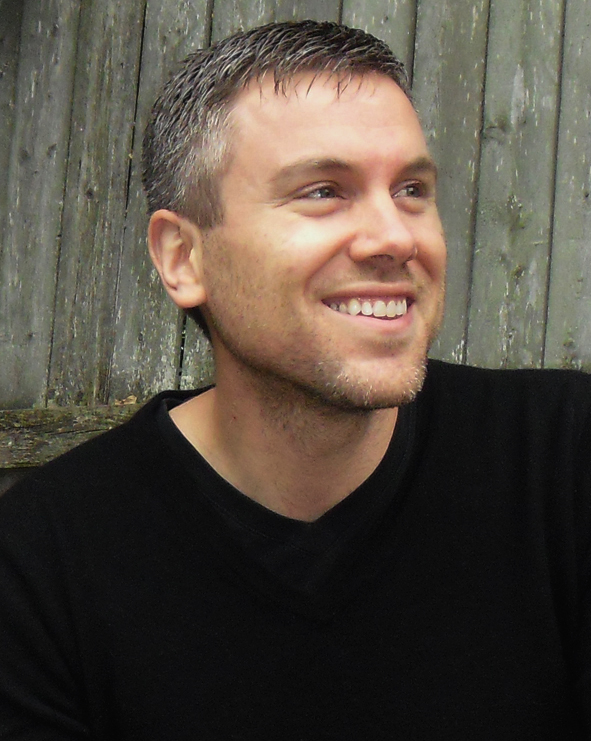Justin Hunt; ABSENT, a new documentary about Fatherhood
by Boysen Hodgson
Target; this movie, as Justin Hunt says, is targeted to men. And often it is women who ‘get’ the film.
Energy embodied; informational, emotional, invitational
Empowering intent; To present a simple thesis … ‘the father is the first human being in a child’s life who either chooses them, or not …’ and the choice, intended or unintended, has consequences.
Primary archetypes; the lover, the king
Commitment; 1.5 hours
To start this review, take a look at the trailer for Justin Hunt’s newest film, ABSENT, about the role of men as fathers and father figure in modern culture and the impact that the absence, literal and figurative, of strong male role models for young people is having.
Justin has already built a reputation from his previous major documentary release, American Meth (see preview), which took an incredibly hard hitting look at the impact of the methamphetamine epidemic in the United States.
ABSENT is about a topic much closer to home for most of us in the the USA – the absence of a father or healthy father figure – and the impact that this absence has throughout life. Hunt interviews some powerful figures in faith-based men’s work, like John Eldridge of the Ransomed Heart Ministries and Father Richard Rohr. But he ALSO interviews prostitutes and homeless folks, a world champion boxer and James Hetfield of the legendary heavy metal band Metallica (which is awesome!).
What I really like is that the film presents some deeply honest emotional responses to the wound left in many people’s lives by the absence of a positive male role model and the damage that a negative father figure can have on a child or an adult. These wounds influence unconscious decision-making if not addressed and healed in some way.
The voices and images in the film show how the lack of mature Fathers can shape fundamental beliefs about who we are in the world; whether we’re ‘worthy’ of love and affection, whether we’re capable and competent, whether we’re valuable, whether we will ‘amount’ to anything as adults, whether we will become good parents … the list goes on and on. And a positive Father figure can also turn the world around, helping to instill a sense of purpose, of competence, of ‘I can do anything I put my mind to’. Hunt connects with this on a personal and cultural level, and his love of people and desire for our society to create healthy Dads shows in every scene. The movie is a wake up call to what we have co-created in our society, and makes some good suggestions about how to get started fixing it. His passion for being part of the solution shows through, and it gave me hope for what we might accomplish together in our world with increased awareness.
I had the opportunity to speak with Justin before a recent trip to Minneapolis to screen the film:
ABSENT is a good watch. I recommend it. The development of healthy male role models as ‘Fathers’ in our culture is desperately needed. I know that I have had to work in my adult life to overcome the wounds that I suffered in childhood because of the unconscious and harmful actions of my own Father.
My Dad is a good man, who cared for me and did the best he could. I have a great relationship with him today. I know that the choices he made in raising his sons (me and 3 brothers) have had long term impacts on how we handle our own families and relationships. I know that his ABSENCE in key areas of my life informs a pattern of behavior that I have repeated; in the ways that I abandon and neglect those that I care about. I see this clearly now in my life, but it has taken years of working with other men in a conscious and challenging way to help me look in that mirror. Because who wants to be like their ‘bad’ Dad? What’s frightening is how easy it is, and how culturally acceptable, to let those harmful patterns become the cultural norm, unaddressed by the men who are suffering. The kind of neglecting behavior that I see coming out of what I witnessed as a child would be dismissed by the vast majority of men as ‘normal’ guy behavior.
So as men – taking on the mantle of a healthy Father means exposing and confronting our unconscious behaviors in the culture that we perpetuate. We create a way of being as men that reinforces cultural blindness by making it ‘manly’ to stay silent about the things that hurt. Our privilege as men is a blade that cuts both ways. And Justin Hunt and I agree – we can’t do this alone. Initiation, men’s brotherhood and personal growth are prerequisite to healing our culture.
Absent faces this reality.
I also have structural critiques about the way that gender is presented in the film. I trust some of the research that lays out structural (neurological, hormonal) differences between males and females … and … I believe that our cultural upbringing and structures have far more impact on what we commonly define as ‘gendered’ behavior. I believe that boys are ‘wired’ differently than girls … and … I also believe that the majority of what we express as boys and girls is determined by what we see and experience culturally. So when the film makes somewhat specific claims about ‘what boys want’ and ‘what girls want’ from the father figure, I am skeptical. Not that boys and girls don’t want those things, but that boys AND girls want ALL those things … to be seen as competent, strong and capable and to be seen as acceptable, beautiful, and worthy.
Boys and girls need to be loved and cared for. The cultural operating system that gets loaded in the earliest stages of life determine the strategies that boys and girls use to go about getting cared for. I’m sure that there is anthropological and sociological evidence for why some of those [gendered] behaviors have persisted over the ages, but I have a hard time seeing most ‘gendered’ behavior as innate.
And none of this structural analysis makes a difference to the psychological wounding that occurs when human development is thrown off track by unhealthy relationships being inflicted on children by men who have no idea how to create healthy relationships or interactions. Not wiring, culture.
We need psychologically healthy men relating with children.
We need psychologically healthy men modeling what relationships between men can look like, and what healthy relationships between men and women looks like.
I don’t believe that there has to to be a male parent in order to raise a healthy child [I love this video of Zach Wahls]. I don’t believe there has to be a female parent in order to raise a healthy child. And I do believe that when a parent abandons, abuses or disappears from raising a child – this has negative implications over the long term; on our families, communities and culture. Because of the way that we have co-created our society, men are more often the parent to be absent from a child’s life. So in this sense, we really need Dads.
We also need men and women who embody the healthy ways of being and acting that have been ‘gendered’ as masculine; direct and focused action to get things done. Our planet needs this. Our institutions need this. But we need it with the healthy balance of empathy, care, justice and compassion that have more often been typed as ‘feminine’.
I believe the film. It feels honest and has sincere intentions. I liked watching it and I’m planning to watch it again as a starting place for discussion in my men’s group and in my local community. What Hunt has done with the film is create a very watchable documentary about a subject that is often covered in theatrical films through drama (the 2011 film Tree of Life comes to mind, as well as scores of others), but not talked about often in our culture, especially among adult men.
Hunt is asking, “What are we going to do about this?”, and providing some directions for men and women to look.
– is a deeply personal issue that everyone decides for himself. Sometimes the price is high, sometimes low. But this is not very important for life. Life is an interesting thing. And the price on Viagra – too.



